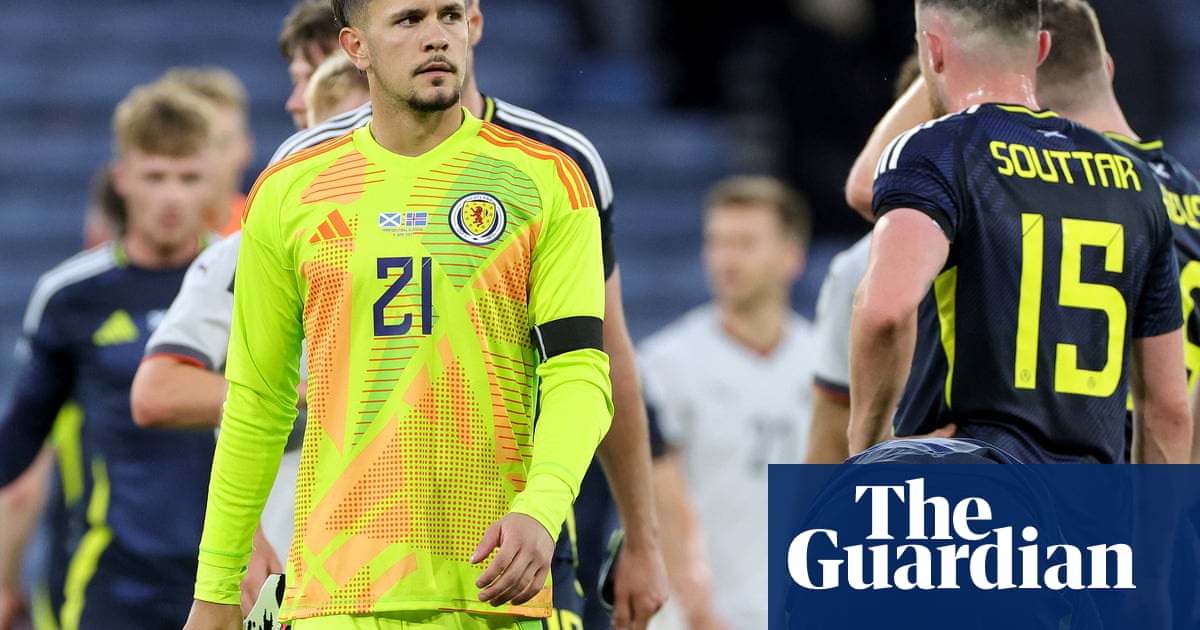A year ago,Scotlandwere heading for the European Championships amid wild excitement. Events since have included Nations League high points but umpteen chastening experiences. This proved another of the latter.
For the second game in succession, Steve Clarke’s team lost three goals at home. The nature of Iceland’s success – a fully deserving one – in Glasgow felt ominous in respect of an upcoming World Cup qualifying campaign. With Germany and the Euros such a distant memory, Clarke does not have his troubles to seek. Scotland look a team that has passed its peak. There were no redeeming features at all attached to this display. Clarke must be alarmed.
The opening to the game was notable for the injury sustained by the Scotland goalkeeper Angus Gunn. When collecting a routine cross, Gunn’s ankle clattered into Andri Gudjohnsen with the consequences apparently serious. Gunn limped from the field after just six minutes.
Gunn’s replacement, the debutant Cieran Slicker, was to endure an inauspicious arrival in international football. With just his second touch, Slicker kicked the ball straight to Stefán Teitur Thórdarson. Gudjohnsen was the gleeful recipient of Thórdarson’s header, the Gent man taking one touch before sending a glorious left foot shot into Slicker’s top right hand corner.
Whether affected by the goalkeeper change or otherwise, the Scots were horribly ragged in the first quarter. The position has long been regarded as a problematic one, the consequence of negligence by clubs and the Scottish FA when the country did have a batch of fine custodians. Neither Gunn nor Slicker in truth are international class goalkeepers. The current best option, Craig Gordon, is 42.
George Hirst should have levelled the scores, the Ipswich striker instead heading over when it looked easier to find the net from a John McGinn cross. As Hirst came close again, Scotland had found their pulse. John Souttar claimed the equaliser after meeting Max Johnston’s corner with a stooping header.
Scotland were behind again before the interval, this time on account of hilariously incompetent defending. An Iceland corner flew off Lewis Ferguson and into Grant Hanley. As the ball rebounded off Ferguson again, Slicker chose to dive over the top of it. No Iceland player had touched the ball from the set play. All that was lacking was an appearance from the Keystone Cops. Scotland were booed off at half-time.
Slicker’s night was to get even worse. Victor Pálsson met an Albert Gudmundsson free-kick with his head, a matter that should have provided no real problem for the goalkeeper. However, the ball flew right through Slicker’s hands. This had become a painful watch and a painful listen; Scotland’s support mocked Slicker when he picked up a loose ball soon after Iceland’s third. This was a cruel if calamitous scene for Slicker, whose only club first team appearance last season was as an 81st minute substitute for Ipswich against Bristol Rovers. What did we really expect?
Sign up toFootball Daily
Kick off your evenings with the Guardian's take on the world of football
after newsletter promotion
Hirst thought he had restored hope. Scott McTominay, hitherto quiet, fired in a low shot which Elias Rafn Ólafsson could only palm to Hirst’s feet. The VAR and an offside call dulled brief Scottish excitement.
Clarke has presided over a dozen friendlies and won two, against the might of Luxembourg and Gibraltar. Technically, those results barely matter. The standard of Scotland’s play does, though. They will be nowhere near the World Cup if this total malfunction proves a sign of things to come.
